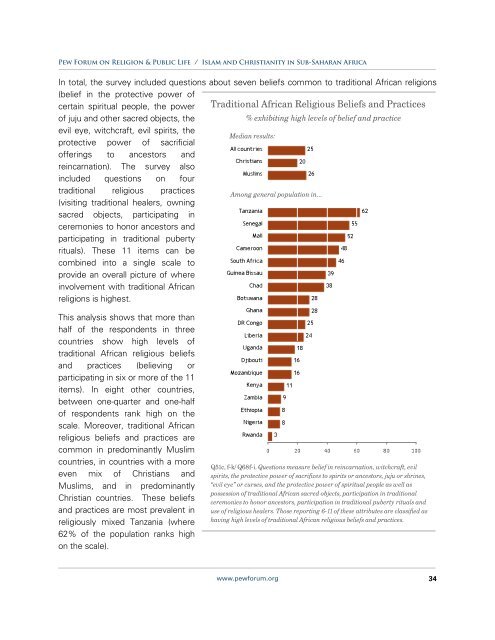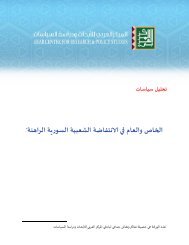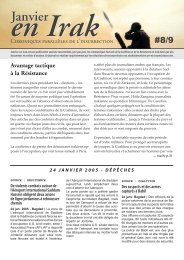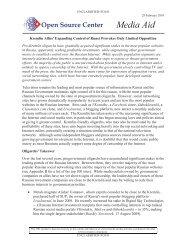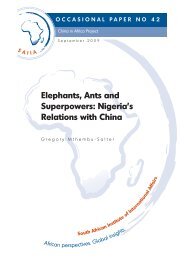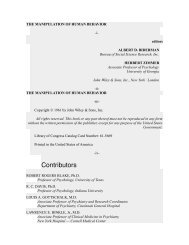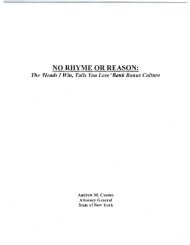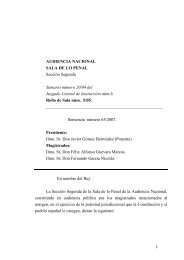Islam and Christianity in Sub-Saharan Africa
Islam and Christianity in Sub-Saharan Africa
Islam and Christianity in Sub-Saharan Africa
Create successful ePaper yourself
Turn your PDF publications into a flip-book with our unique Google optimized e-Paper software.
Pew Forum on Religion & Public Life / <strong>Islam</strong> <strong>and</strong> <strong>Christianity</strong> <strong>in</strong> <strong>Sub</strong>-<strong>Saharan</strong> <strong>Africa</strong><br />
<br />
In total, the survey <strong>in</strong>cluded questions about seven beliefs common to traditional <strong>Africa</strong>n religions<br />
(belief <strong>in</strong> the protective power of<br />
<br />
certa<strong>in</strong> spiritual people, the power Traditional <strong>Africa</strong>n Religious Beliefs <strong>and</strong> Practices<br />
of juju <strong>and</strong> other sacred objects, the<br />
% exhibit<strong>in</strong>g high levels of belief <strong>and</strong> practice<br />
evil eye, witchcraft, evil spirits, the<br />
protective power of sacrificial<br />
Median results:<br />
offer<strong>in</strong>gs to ancestors <strong>and</strong><br />
re<strong>in</strong>carnation). The survey also<br />
<strong>in</strong>cluded questions on four<br />
traditional religious practices<br />
Among general population <strong>in</strong>…<br />
(visit<strong>in</strong>g traditional healers, own<strong>in</strong>g<br />
sacred objects, participat<strong>in</strong>g <strong>in</strong><br />
ceremonies to honor ancestors <strong>and</strong><br />
participat<strong>in</strong>g <strong>in</strong> traditional puberty<br />
rituals). These 11 items can be<br />
comb<strong>in</strong>ed <strong>in</strong>to a s<strong>in</strong>gle scale to<br />
provide an overall picture of where<br />
<strong>in</strong>volvement with traditional <strong>Africa</strong>n<br />
religions is highest.<br />
This analysis shows that more than<br />
half of the respondents <strong>in</strong> three<br />
countries show high levels of<br />
traditional <strong>Africa</strong>n religious beliefs<br />
<strong>and</strong> practices (believ<strong>in</strong>g or<br />
participat<strong>in</strong>g <strong>in</strong> six or more of the 11<br />
items). In eight other countries,<br />
between one-quarter <strong>and</strong> one-half<br />
of respondents rank high on the<br />
scale. Moreover, traditional <strong>Africa</strong>n<br />
religious beliefs <strong>and</strong> practices are<br />
common <strong>in</strong> predom<strong>in</strong>antly Muslim<br />
countries, <strong>in</strong> countries with a more<br />
even mix of Christians <strong>and</strong><br />
Muslims, <strong>and</strong> <strong>in</strong> predom<strong>in</strong>antly<br />
Christian countries. These beliefs<br />
<strong>and</strong> practices are most prevalent <strong>in</strong><br />
religiously mixed Tanzania (where<br />
62% of the population ranks high<br />
on the scale).<br />
<br />
Q51c, f-k/Q68f-i. Questions measure belief <strong>in</strong> re<strong>in</strong>carnation, witchcraft, evil<br />
spirits, the protective power of sacrifices to spirits or ancestors, juju or shr<strong>in</strong>es,<br />
“evil eye” or curses, <strong>and</strong> the protective power of spiritual people as well as<br />
possession of traditional <strong>Africa</strong>n sacred objects, participation <strong>in</strong> traditional<br />
ceremonies to honor ancestors, participation <strong>in</strong> traditional puberty rituals <strong>and</strong><br />
use of religious healers. Those report<strong>in</strong>g 6-11 of these attributes are classified as<br />
hav<strong>in</strong>g high levels of traditional <strong>Africa</strong>n religious beliefs <strong>and</strong> practices.<br />
<br />
www.pewforum.org 34


